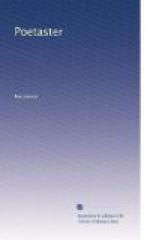In his comedies of London life, despite his trend towards caricature, Jonson has shown himself a genuine realist, drawing from the life about him with an experience and insight rare in any generation. A happy comparison has been suggested between Ben Jonson and Charles Dickens. Both were men of the people, lowly born and hardly bred. Each knew the London of his time as few men knew it; and each represented it intimately and in elaborate detail. Both men were at heart moralists, seeking the truth by the exaggerated methods of humour and caricature; perverse, even wrong-headed at times, but possessed of a true pathos and largeness of heart, and when all has been said—though the Elizabethan ran to satire, the Victorian to sentimentality—leaving the world better for the art that they practised in it.
In 1616, the year of the death of Shakespeare, Jonson collected his plays, his poetry, and his masques for publication in a collective edition. This was an unusual thing at the time and had been attempted by no dramatist before Jonson. This volume published, in a carefully revised text, all the plays thus far mentioned, excepting “The Case is Altered,” which Jonson did not acknowledge, “Bartholomew Fair,” and “The Devil is an Ass,” which was written too late. It included likewise a book of some hundred and thirty odd ‘Epigrams’, in which form of brief and pungent writing Jonson was an acknowledged master; “The Forest,” a smaller collection of lyric and occasional verse and some ten ‘Masques’ and ‘Entertainments’. In this same year Jonson was made poet laureate with a pension of one hundred marks a year. This, with his fees and returns from several noblemen, and the small earnings of his plays must have formed the bulk of his income. The poet appears to have done certain literary hack-work for others, as, for example, parts of the Punic Wars contributed to Raleigh’s ’History of the World’. We know from a story, little to the credit of either, that Jonson accompanied Raleigh’s son abroad in the capacity of a tutor. In 1618 Jonson was granted the reversion of the office of Master of the Revels, a post for which he was peculiarly fitted; but he did not live to enjoy its perquisites. Jonson was honoured with degrees by both universities, though when and under what circumstances is not known. It has been said that he narrowly escaped the honour of knighthood, which the satirists of the day averred King James was wont to lavish with an indiscriminate hand. Worse men were made knights in his day than worthy Ben Jonson.
From 1616 to the close of the reign of King James, Jonson produced nothing for the stage. But he “prosecuted” what he calls “his wonted studies” with such assiduity that he became in reality, as by report, one of the most learned men of his time. Jonson’s theory of authorship involved a wide acquaintance with books and “an ability,” as he put it, “to convert the substance or riches of another poet to his own use.”




